“Slavdom is just the outset of alliance” (F. M. Dostoevsky): Th e Idea of slavic Unity in the Context of christian Universalism
Abstract
The article considers the interpretation of the Slavic question in the context of Russian thought of the 19th century that is connected with the idea of justifying history, with the belief in the possibility of its turning to good ways, with the theme of “The God Kingdom on earth”. It is shown that the Slavic unity was interpreted within the context of Christian universalism by A. S. Khomyakov, F. I. Tyutchev, I. S. Aksakov, F. M. Dostoevsky, N. F. Fedorov, V. S. Solovyov. Russian writers and thinkers expanded the Slavic question beyond national, political and confessional boundaries. Th ey believed that Russia, in alliance with the Slavs, was summoned to embody the ideal of a new universal community that would be bound not by “blood and iron”, but by love and faith. Th e Slavdom, in their opinion, should establish the ideas of Christian politics in international relations, contrasting the principles of ‘vsesluzhenie’, brotherhood, selflessness, sacrifice to national and governmental egoism, whereas the model of ‘sobornost’ — where personality and universality, national and individual are in balance — ought to take over atomicity and disunity of the humanity.

